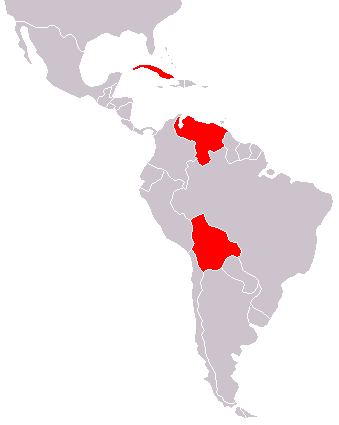Trade treaty of the peoples
The Trade Treaty of the Peoples ( Spanish Tratado de Comercio de los Pueblos , TCP) is a trade agreement signed on April 29, 2006 by the presidents of Bolivia , Venezuela and Cuba in Havana , which establishes solidarity trade relations between the three states.
It is a counter-project to the US- dominated FTAA , which was rejected by Brazil , Argentina , Paraguay , Uruguay and Venezuela in November 2005 at the America summit in Mar del Plata , Argentina , because these states felt they were disadvantaged by the agreement. Venezuela's President Hugo Chavez celebrated the rejection as a personal victory over US President George Bush . In return, the USA concluded individual contracts with Peru and Colombia, initially for the delivery of subsidized soy, which in turn could damage Bolivia economically (Bolivia has so far supplied Colombia with soy worth 140 million euros annually).
In the trade treaty of the peoples, Bolivia joins the agreement concluded between Venezuela and Cuba on December 14, 2004 as part of the ALBA . Among other things, the peoples' trade agreement stipulates the exchange of technologies and technological equipment and the joint fight against illiteracy.
In particular, the contract stipulates that Cuba will support Bolivia in its literacy program and in other areas of education, as well as in setting up centers for ophthalmology by providing high technology and specialist doctors. In addition, Cuba gives Bolivia its experience in the field of energy saving.
Cuba and Venezuela each provide 5000 scholarship places for Bolivians to train medical professionals and in other areas.
Venezuela is committed to extensive cooperation in the energy and mining sectors with Bolivia, to create a special fund for the financing of production and infrastructure projects, to cooperate in research studies of biodiversity and in the telecommunications sector, to increase imports of Bolivian products, to donate $ 30 million for social and productive needs and to donate an asphalt and asphalt mixing plant.
Bolivia can use the infrastructure and facilities of the sea and air transport of Venezuela under preferential conditions and the establishment of Bolivian companies in Venezuela for raw material processing is facilitated.
Bolivia undertakes to deliver its mining, agricultural, agro-industrial, fishing and industrial products as far as they are required by Cuba and Venezuela and to deliver fuel.
Furthermore, an exchange of experiences in the research of indigenous peoples , on the study and regaining of the knowledge of the ancestors about naturopathy, as well as about scientific research of natural resources and the agricultural and livestock genetic guidelines is agreed.
For trade with Bolivia, Cuba and Venezuela will immediately remove all tariffs and all other non-tariff barriers. Cuba and Venezuela guarantee the purchase of all agricultural and industrial products in Bolivia that have lost their sales market due to free trade agreements with the USA or European governments. Cuba and Venezuela are helping Bolivia establish a state airline and develop the sport. Furthermore, Cuba and Venezuela pledge their support in Bolivia's demand for an unconditional cancellation of its foreign debt.
See also
Web links
- German translation of the trade treaty of the peoples
- tagesschau.de: The USA are losing their "backyard" (tagesschau.de archive), April 29, 2006
- A "Bolivarian Alternative for America" - Bolivia, Cuba and Venezuela sign the "Trade Treaty of the Peoples" (TCP) , May 2, 2006
